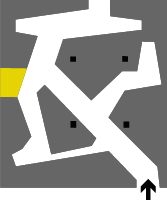Josef Drahotský 1895 - 1941
Born 6.6.1895 in Všestary
Died 13.12.1941 in Mauthausen
Biography
Josef Drahotský was born on 6 June 1895 in the village of Vsestary near Hradec Králové in what is now the Czech Republic. His parents were farmers. He wanted to become a teacher and studied at the Teaching Academy but his plans were disrupted by the start of World War I. Josef Drahotský began active military service on 15 March 1915 in Hradec Králové as a one-year volunteer. In June 1915 he was sent to the Italian front where he was wounded in August 1916. After recovering he was promoted to corporal and re-assigned to his former battalion. In 1917 he graduated from the school for reserve officers in Ostrihom and in May 1918 was assigned to the 2nd Cavalry Regiment in Vysoké Mýto, with whom he returned to the Italian front.
In November 1918 Josef Drahotský joined the newly-formed Czechoslovak army in Vysoké Mýto as a lieutenant and entered into service as a troop commander of his regiment, later renamed the 9th Cavalry Regiment. In 1925 he was promoted to the rank of captain. He served with the 9th Cavalry Regiment in Vysoké Mýto until June 1933 when he was transferred to the 2nd Cavalry Regiment ‘Siberia’ in Olomouc as commander of the 5th Squadron, and subsequently to Brno as commander of the 2nd Armoured Squadron. In September 1935 he was transferred to Milovice where he became an instructor of tank tactics. In September 1937 he was promoted to the rank of major and in October of that year became the company commander of the 1st Tank Regiment in Milovice. During the mobilisation of 1938, he was troop commander of the 1st Regiment of Tank Reserves.
After the Czechoslovakian armed forces were dissolved in 1939, Josef Drahotský was assigned to the local district office in Klatovy and later earned a position with the local district office in Pardubice. He worked for the resistance with Captain Jan Slavík from Prague, with Václav Kradecký from Lysé nad Labem, and with the teacher Janacek from Pardubice. There is evidence that he distributed anti-German pamphlets obtained from Captain Slavík from Prague. His position as a district cultural official also made it possible for him to smuggle banned books and second-hand journals to local librarians and journalists in order to distribute news from foreign sources.
On 16 October 1941, Josef Drahotský was arrested by the Gestapo, allegedly for weapons possession. After Pardubice was bombed, he was transferred to the Pankrác prison in Prague and interrogated by the Gestapo at the Petschek Palace. On 18 November 1941, without having been sentenced, he was transferred to the concentration camp in Mauthausen. The family received no news of the fate of Major Drahotský until an inquiry sent to the commandant of Mauthausen concentration camp on 15 December 1941 was returned with a note stating that the prisoner had ‘died’ on 13 December.
Following the liberation of the Czechoslovak Republic, Josef Drahotský was posthumously awarded the 1939 Československý válečný kříž (Czechoslovak Military Cross) and promoted to the rank of lieutenant-colonel in memoriam. After the Communist takeover in February 1948, his widow Jarmila Drahotska and son Lubor went into exile and settled permanently in Canada. Lubor Drahotský married Helina Mardus of Põltsamaa, Estonia. They had two children – Boris Alexander and Lena Jarmila. Lena has two children – Kazimir and Josef.
Alex Drahotsky / Lena Drahotsky
Translation into English: Joanna White
Location In room

